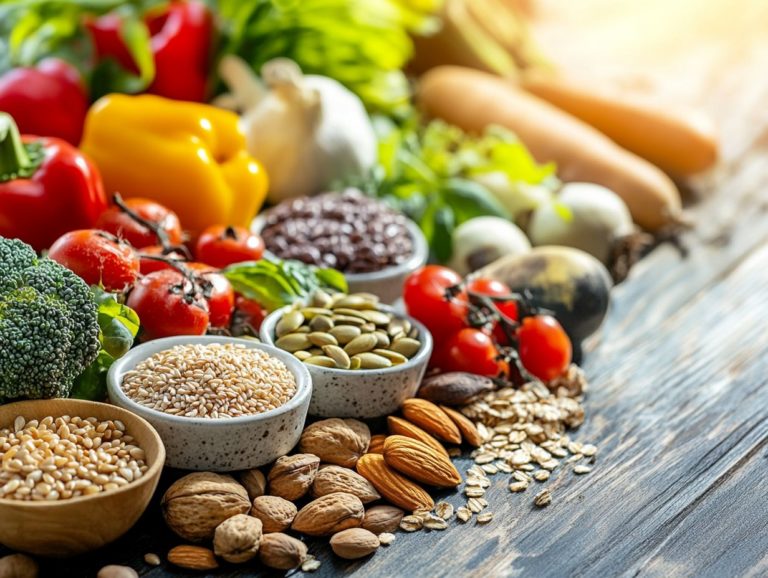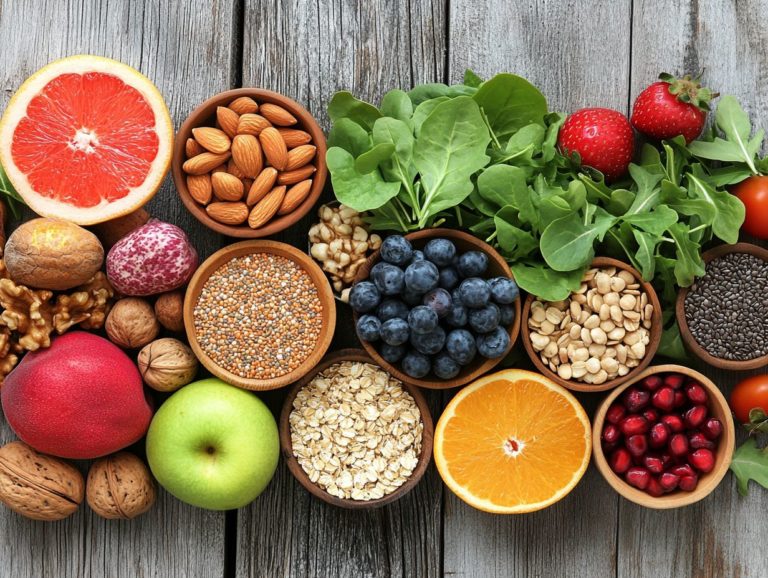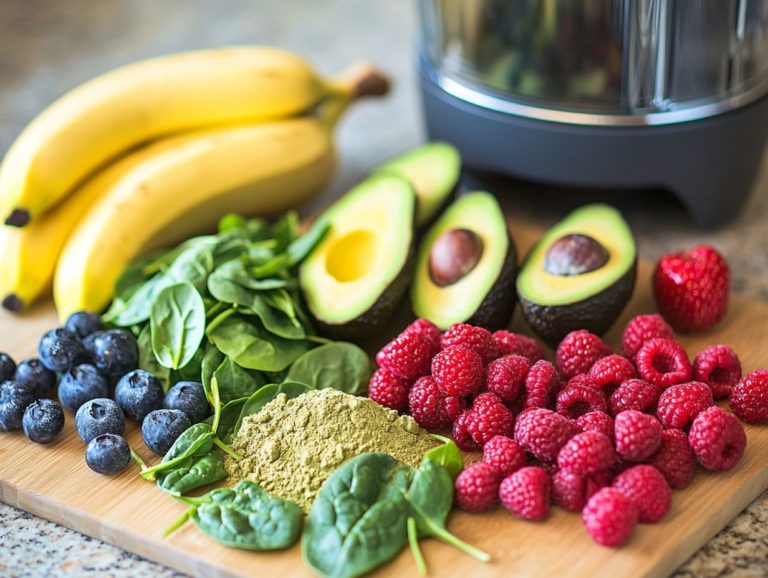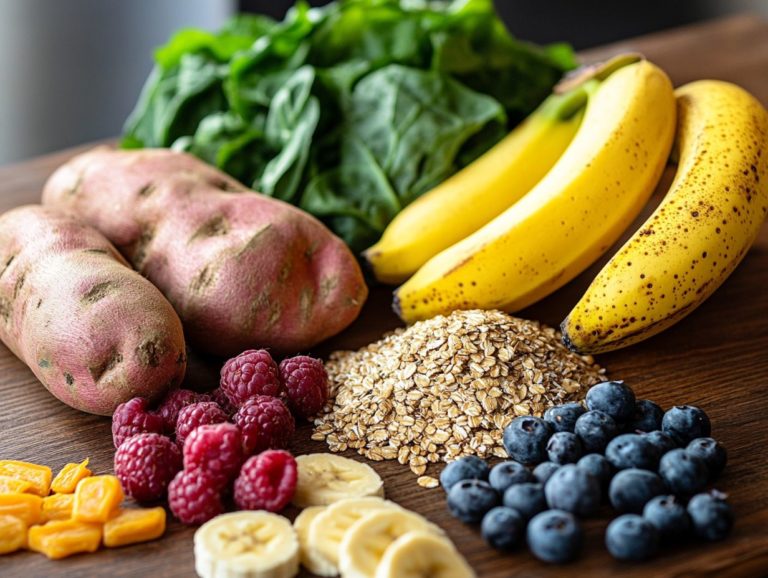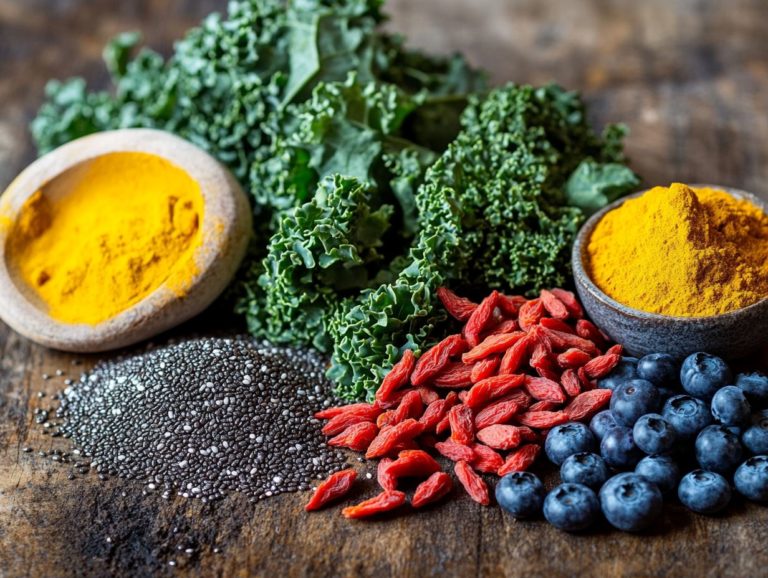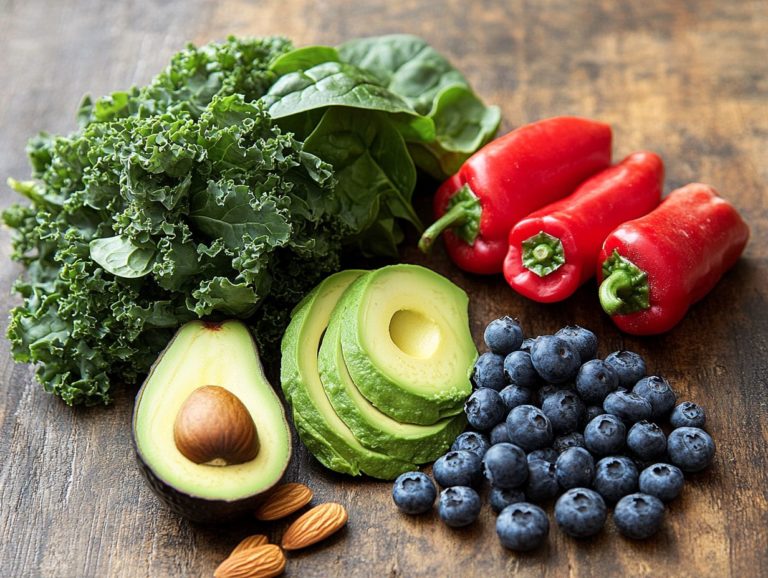Top 10 Food Sources for Optimal Hydration
Staying hydrated is key for your overall health, yet it s easy to overlook the significant role that food plays in keeping your body hydrated. While sipping on water is certainly the go-to option, an array of foods can also contribute to keeping you refreshed and nourished. Get ready to discover how delicious staying hydrated can be with these fantastic foods!
Let s explore the top 10 food sources that offer optimal hydration, ranging from juicy fruits to crisp vegetables. Along the way, you ll uncover the benefits of hydration, recognize the signs of dehydration, and discover tips for seamlessly incorporating these hydrating foods into your daily diet. Dive into these hydrating foods to boost your wellness and energy!
Contents
Key Takeaways:
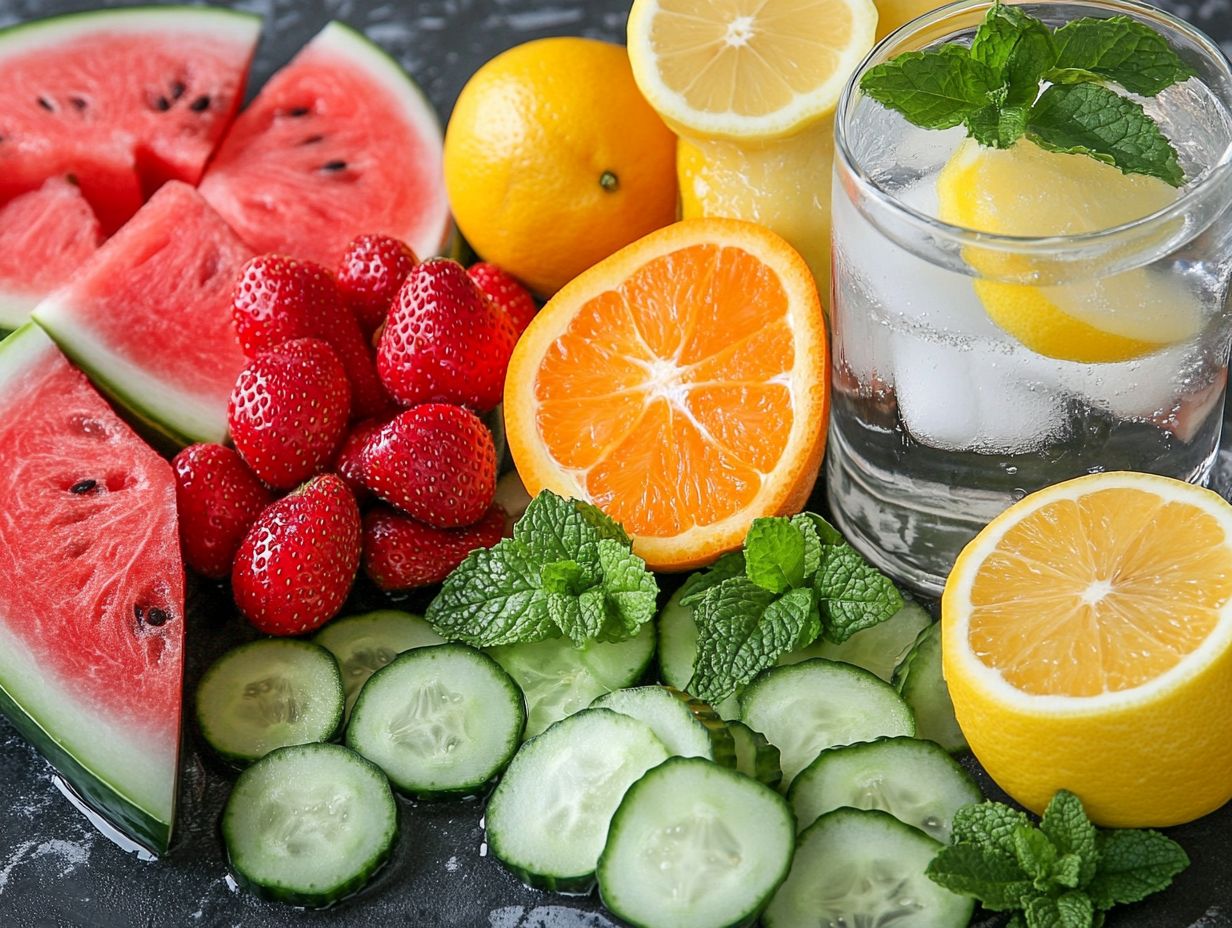
Keep hydrated with water and coconut water, the top two sources of hydration. Incorporate hydrating foods like cucumber, watermelon, and strawberries into your meals for added hydration. Avoid foods that can dehydrate you, such as salty snacks, and aim for at least 8 cups of water a day for optimal hydration.
1. Water
Water serves as the foundation of hydration, important for keeping your body hydrated and playing a critical role in various health benefits, including nutrition, mental wellness, and physical performance.
The National Institutes of Health underscores the importance of daily fluid intake to ward off dehydration, which can pose significant health risks, particularly in relation to chronic diseases. By understanding how water interacts with other nutrients, you can enhance your hydration levels and contribute positively to public health outcomes.
This key liquid aids in nutrient absorption, allowing your body to effectively process the vitamins and minerals that are crucial for energy production and overall wellness.
Proper hydration not only helps regulate your body temperature but also ensures efficient thermoregulation during physical activity or in extreme heat. Your immune system’s effectiveness also hinges on adequate hydration, as water facilitates the transport of essential immune cells throughout your body.
Daily fluid recommendations can differ, but the general guideline suggests about 3.7 liters for men and 2.7 liters for women. Following these guidelines can greatly improve your health, reducing the risk of conditions like kidney stones and urinary tract infections, while also enhancing cognitive functions and physical performance.
2. Coconut Water
Coconut water is your go-to natural beverage for exceptional hydration, brimming with important electrolytes minerals that help balance fluids in your body vitamins, and minerals that deliver impressive health benefits, particularly during your physical activities.
This delightful drink stands out as a fantastic alternative to traditional water, thanks to its unique composition that includes vital electrolytes like potassium, sodium, and magnesium. These elements are crucial for replenishing lost fluids and boosting muscle function, making coconut water a favorite among athletes and fitness enthusiasts alike.
By integrating coconut water into your hydration routine, you can enhance your endurance and expedite recovery after exercise. Its subtly sweet and refreshing flavor not only quenches your thirst but also offers a nutrient boost, establishing it as a superior choice for hydration compared to plain water.
3. Cucumber
Cucumber is your go-to hydrating vegetable, featuring an impressive water content that makes it an exceptional choice for enhancing hydration. It also delivers important vitamins, minerals, and dietary fiber, contributing to a wealth of health benefits.
With their low-calorie count and rich antioxidant profile, cucumbers make for the perfect snack if you re aiming to maintain a healthy weight while still reaping key nutrients. By incorporating cucumbers into your salads or smoothies, you not only elevate the flavor but also maximize their health benefits.
For a refreshing green smoothie, consider blending cucumbers with spinach, mint, and a splash of lime juice it’s a revitalizing drink that ll leave you feeling invigorated. Don t wait make cucumbers a staple in your diet today to keep your hydration levels high!
Alternatively, a crunchy cucumber salad tossed with cherry tomatoes, red onion, and a drizzle of olive oil can serve as a light, nutritious side dish that delights your palate.
4. Celery
Celery is a hydrating food packed with water. It’s perfect for refreshing yourself.
It also provides essential minerals that support physical performance and daily nutrients.
Try adding celery to your meals. Slice it for salads, blend it into smoothies, or enjoy it with hummus.
With low calories and dietary fiber, celery helps you feel full while promoting digestion.
5. Watermelon
Watermelon isn t just a delightful summer treat; it s a hydration powerhouse. Overflowing with water, it offers numerous health benefits, including rich antioxidants that boost your well-being.
This vibrant fruit is loaded with essential vitamins like A, C, and B6. These vitamins strengthen your immune system and promote skin health.
If you re interested in supporting heart health, the citrulline in watermelon can help improve blood flow and lower blood pressure.
Incorporating watermelon into your meals is easy. Toss fresh chunks into salads, blend them into smoothies, or enjoy them as a sweet snack on hot days.
With its versatility, you ll always find a fun way to enjoy watermelon!
6. Strawberries
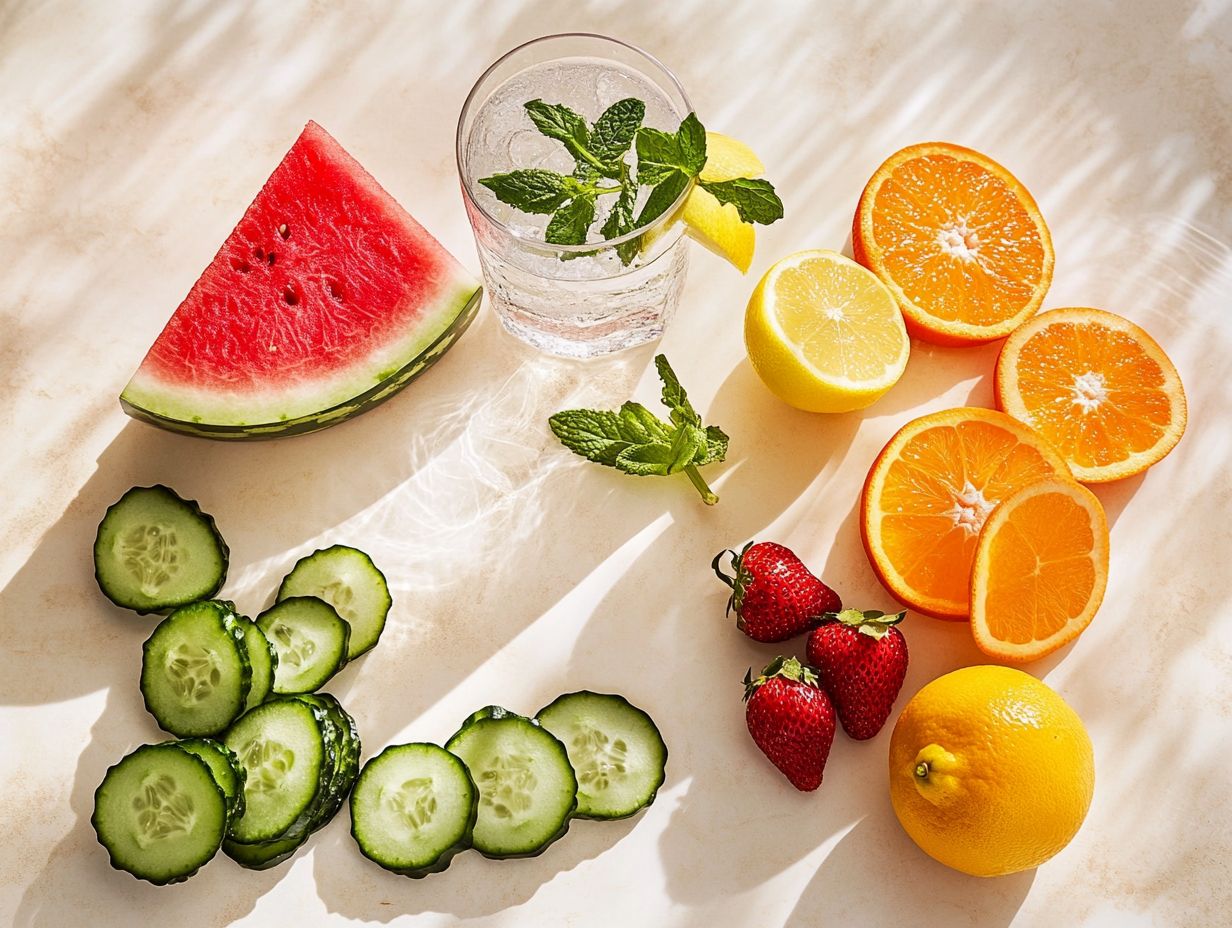
Strawberries are top-notch hydrating fruits. They are brimming with water and packed with antioxidants and vitamins that enhance your health.
These vibrant berries are especially rich in vitamin C and vitamin K. Vitamin C aids collagen production while vitamin K is crucial for blood clotting.
For better hydration, include strawberries in your smoothies, salads, or desserts. They offer a refreshing burst of flavor and boost your daily nutrient intake.
Enjoying them as a solo snack not only satisfies sweet cravings but also provides a guilt-free treat full of essential vitamins.
7. Lettuce
Lettuce varieties like romaine and iceberg are refreshingly crisp and excellent sources of hydration. They provide dietary fiber and essential nutrients for a balanced diet.
But don t stop there explore options like butterhead for its tender leaves, or arugula for a peppery kick. Each brings unique textures and flavors to your meals.
Using different lettuces not only elevates taste but also enhances nutrition, as they re rich in vitamins A, C, and K.
Mixing various lettuces in salads or using them as wraps can boost hydration and add variety to your meals. Their low calorie content is perfect for maintaining or losing weight.
8. Tomatoes
Tomatoes are a versatile fruit that provides great hydration and a wealth of antioxidants, essential vitamins, and minerals.
Their culinary flexibility allows for different cooking methods affecting nutrient absorption. For example, roasting tomatoes enhances how well your body can use lycopene, a powerful antioxidant supporting heart health.
To maximize hydration, incorporate fresh tomatoes into salads, salsas, or smoothies. Adding them to soups and stews infuses moisture while delivering essential nutrients.
Don t miss out on incorporating these hydrating foods into your diet!
9. Cantaloupe
Cantaloupe is a hydrating gem, bursting with water content, vitamins, and antioxidants. It serves as a sweet solution for keeping your hydration levels in check, especially during those sweltering days.
This delightful melon not only quenches your thirst but also delivers a substantial nutritional boost. It’s packed with vitamins A and C, which support your immune function and enhance skin health.
Incorporating cantaloupe into your snacks or salads is effortless. You can enjoy it on its own, sprinkle a bit of lime juice for that refreshing zing, or dice it into vibrant summer salads.
Plus, its low-calorie profile makes cantaloupe the perfect choice for anyone managing their weight. It offers fiber and water to stave off hunger while adding a burst of flavor to your meals.
10. Broth-Based Soups
Broth-based soups are not just comforting; they re also a superb source of hydration, brimming with nutrients, vitamins, and minerals that enhance your overall health.
These soups come in various types, each offering distinct flavors and unique health benefits. Vegetable broth is packed with antioxidants. Chicken broth is great for your joints, while fish broth offers healthy fats for your heart.
Incorporating these soups into your daily meals can significantly boost your hydration levels, especially during colder months when dry air can sneak up on you and lead to dehydration. Savoring a warm bowl of broth-based soup not only provides comfort but also creates a nourishing experience, making it the perfect choice for both solace and sustenance.
What Are the Benefits of Staying Hydrated?
Staying hydrated is crucial for your overall health and offers a wealth of benefits. You can expect improved mental wellness, enhanced physical performance, better immune function, and a reduced risk of chronic diseases.
Regularly drinking fluids can significantly boost your cognitive function. Research indicates that even a mere 2% drop in hydration levels can impair your attention and memory.
When engaging in physical activities, maintaining proper hydration is essential. It enhances your endurance and strength, enabling you to push your limits during workouts. A 2019 review pointed out that mild dehydration can lead to fatigue and a dip in motivation.
Hydration is vital for long-term health, regulating bodily functions and supporting cardiovascular health. Nutritionists recommend that you consume at least eight glasses of water daily. This can notably lower your risk of developing kidney stones and urinary tract infections.
By prioritizing hydration, you’re investing in a healthier lifestyle overall. Don’t wait until you feel thirsty; drink water regularly!
How Much Water Do You Need to Stay Hydrated?
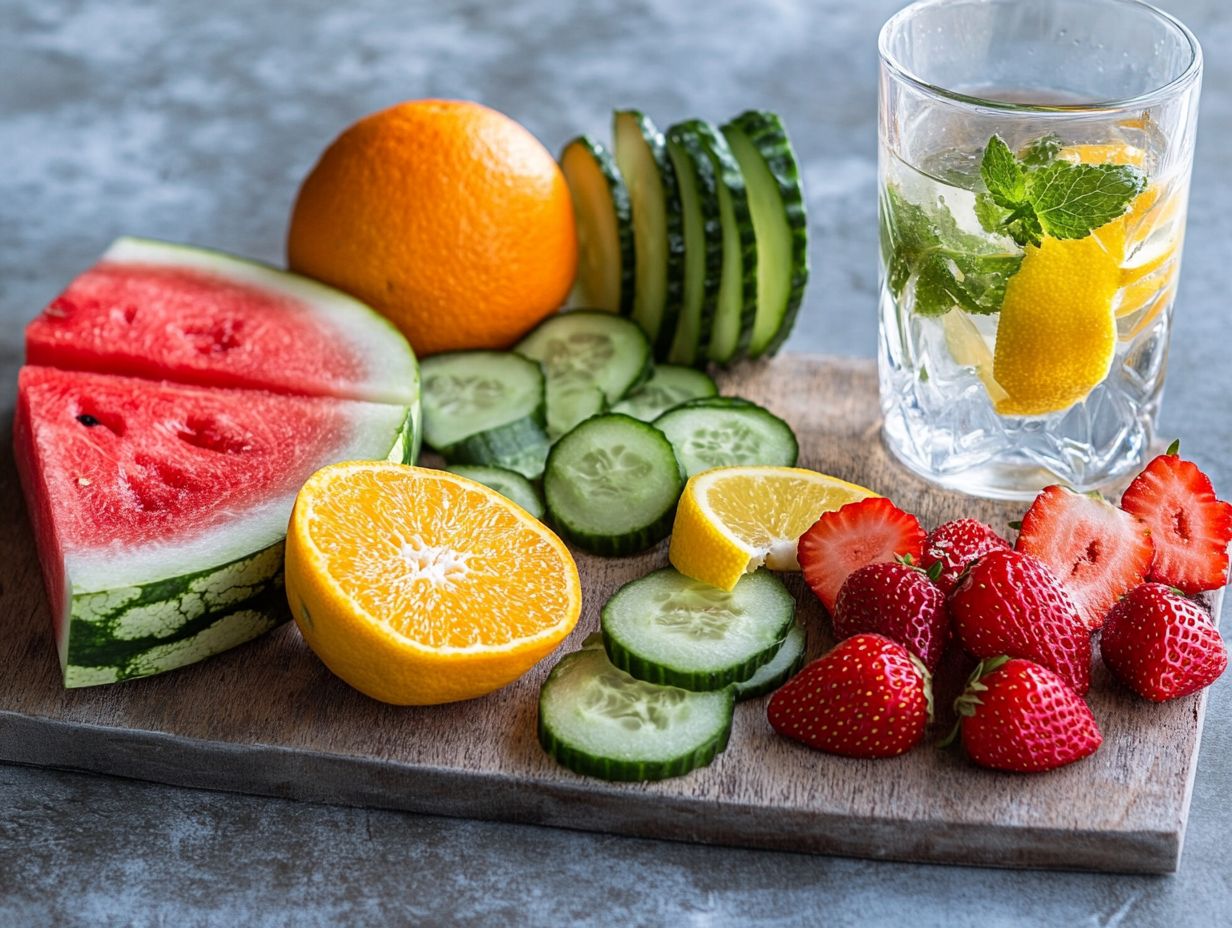
Understanding your hydration needs is essential for maintaining optimal levels. This can depend on various factors such as your age, activity level, and the climate you re in. Reflect on your daily routine, considering how much time you spend outdoors and the intensity of your workouts.
A simple way to check your hydration is to listen to your body. Pay attention to your thirst cues and observe the color of your urine. A light yellow hue usually signals that you re adequately hydrated.
If you lead a highly active lifestyle or find yourself in the sweltering heat of summer, upping your fluid intake becomes vital. Incorporate hydrating foods like fruits and vegetables to significantly boost your overall fluid consumption. This ensures your body remains nourished and revitalized throughout the day.
What Are the Signs of Dehydration?
Recognizing the signs of dehydration is crucial for safeguarding your health. Common indicators include a dry mouth, fatigue, dizziness, and reduced urine output.
These symptoms can escalate quickly, potentially leading to severe complications like heat exhaustion or kidney stones. It’s essential to proactively monitor your hydration levels, especially in hot weather or during vigorous exercise.
A practical strategy is to set reminders to drink water throughout the day, targeting at least eight glasses. Carry a reusable water bottle as a constant visual cue.
Additionally, pay attention to the color of your urine. Pale yellow signals that you’re on the right track. Don’t overlook early warning signs; they are vital for maintaining your overall health and well-being.
How Can You Incorporate These Foods into Your Diet?
Incorporating hydrating foods like cucumber, watermelon, and leafy greens into your diet boosts your hydration levels while providing essential nutrients for your well-being.
By including these vibrant ingredients in your daily meals, you can effortlessly whip up refreshing smoothies packed with vitamins, crisp salads bursting with flavor, and delightful snacks that quench your thirst.
For instance, blending watermelon with mint and a squeeze of lime creates a rejuvenating smoothie perfect for warm days. Tossing together spinach, avocado, and citrus yields a nutrient-rich salad that’s both satisfying and delicious.
These foods offer incredible versatility in flavor and can be prepared in numerous ways. Grill zucchini for a warm side dish or enjoy sliced cucumbers as a crunchy snack.
Hydration can be enjoyable with these options, turning it into a delightful experience.
Are There Any Foods That Can Dehydrate You?
Certain foods can contribute to dehydration and lead to health risks. Items high in sodium or added sugars can exacerbate fluid loss and affect your hydration levels.
Processed snacks like chips and pretzels are high in salt and often leave you feeling thirstier. Sugary treats such as candies and soft drinks can create a cycle of sugar-induced thirst.
To counteract these tendencies, it s essential to incorporate hydration-rich foods into your diet.
- Fruits and vegetables like cucumbers, watermelon, oranges, and strawberries deliver vital vitamins and have significant water content to help maintain optimal hydration.
- Choosing whole grains over overly processed alternatives can also enhance your hydration levels.
By making mindful food choices and balancing salty or sugary items with fresh produce, you can significantly improve your overall health and hydration.
What Are Some Other Tips for Staying Hydrated?
Staying hydrated requires a proactive mindset. Incorporating simple tips like drinking water before meals, setting hydration reminders, and adding hydrating foods to your diet can elevate your daily fluid intake.
Consider establishing specific hydration goals for each day. Using apps or setting alarms on your phone can help keep you on track. Remember, when you’re active, your hydration needs increase, so always have a water bottle handy during workouts.
Don t overlook the impact of climate. If you re exercising outdoors in the heat or at high altitudes, be sure to increase your intake to offset fluid loss through sweat and breathing.
By being mindful of these factors, you can develop better hydration habits that contribute to your health.
Frequently Asked Questions
What are the top 10 food sources for optimal hydration?
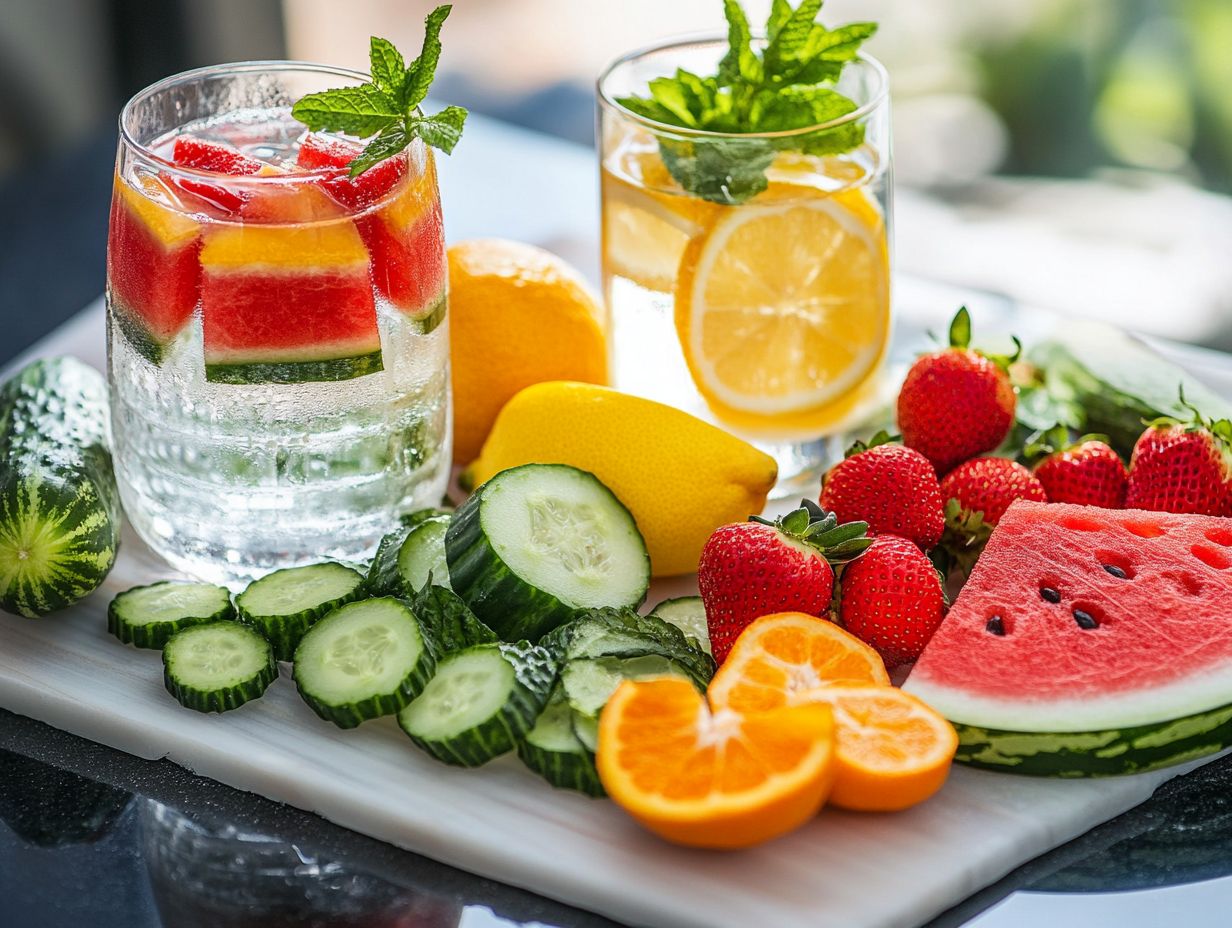
The top 10 food sources for optimal hydration include watermelon, cucumber, celery, lettuce, strawberries, tomatoes, grapefruit, cantaloupe, spinach, and bell peppers, which you can learn more about in this guide on best hydrating foods.
Why is it important to stay hydrated?
Staying hydrated is crucial for maintaining proper bodily functions, such as regulating body temperature, transporting nutrients, and removing waste products.
How much water should I be drinking each day?
The recommended daily water intake varies based on age, gender, and activity level. A good rule of thumb is to aim for 8 glasses of water per day.
Can I get enough hydration from food sources?
Yes, many fruits and vegetables contain high amounts of water and can contribute to your daily hydration needs. However, it is still important to drink water and stay hydrated.
Are there any food sources that can dehydrate me?
Certain foods, such as salty snacks and alcohol, can have a dehydrating effect. It s important to balance your intake of these foods with adequate water consumption.
Can I still stay hydrated if I don’t like drinking water?
Yes, while water is the best source of hydration, options like herbal teas, fruit-infused water, and hydrating foods can also help meet your daily hydration needs.
Start adding these hydrating foods to your grocery list today!

